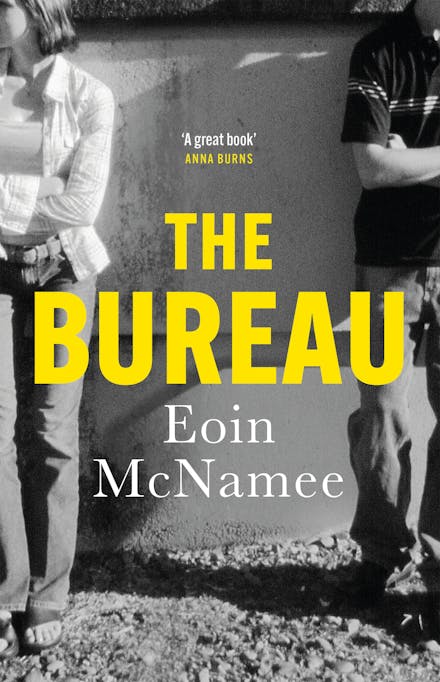Like much of McNamee’s work, his new novel is set during the Troubles in Northern Ireland. The bureau of the title is a ‘bureau de change’, where the shopkeepers and business owners who trade either side of the Irish border can exchange currency. This is only the surface layer of what goes on there, however. The bureau’s main business is in laundering the profits made from the less salubrious smuggling enterprises that form part of the natural ecosystem of the borderland, anything from cigarettes and alcohol to unlicensed diesel to human beings. The men who run the border trade are in permanent danger of death both from each other and from more serious criminals higher up the chain. The women involved with these men – whether wives or lovers – are on a hiding to nothing.

‘My writing has always been concerned with real events and making novels around them,’ McNamee says. ‘In this book, for the first time, they aren’t just public events but events specific to me and my family.’ Brendan McNamee is a solicitor. He opened the bureau after being struck off for embezzling funds. The clients he serves now are not the kind of people you would want to cross and it is not just Brendan who will be in the firing line if he oversteps his mark. On the other side of the counter is Paddy Farrell, who dreams of living ‘a sophisticated life’ in Florida or in Dublin, but who is unable to escape the pull of the border and the shadow life he lives there. Lorraine, a young woman whose intense and morbid spirituality seems at odds with her passionate physical desire for Paddy, longs for a time when the hostilities and underlying trauma of the border years will be behind them – except they never will be.
The events McNamee is writing about happened long before most newspapers began to be digitised and so to properly align fact with fiction you would have to consult the archives of the regional papers, as McNamee quotes them, or know your sources first hand, as McNamee does. If you’re as into this kind of literary mapping as I am, you can at least give yourself a virtual tour of the novel’s locations, glimpse the tracery of minor roads that are the back-ways across the border, see the hills and the forest laybys where deals were transacted, the churchyards, streets and houses where these people lived and died. The distance between Newry and Dundalk is about twenty miles via the main border crossing; in terms of what those miles once represented they span two different worlds.
The border is a liminal space, an uncanny valley between the two.
But The Bureau is not a history book, it is a novel; it’s interesting to wonder about the armature of facts on which this novel is based, but it’s by no means essential. Any book must stand or fall on its own internal merits, on its value as text, and it is as text that The Bureau shines brightest, that it lives in the mind. The Bureau is a poem in prose. From start to finish it holds the reader in a state of tension, of uneasy apprehension of what they know from the opening pages will be the final deadly outcome. Yet there is rapture, too – the inspiration and satisfaction one draws from being in the presence of a great work of art.
They drove away from the hospital, rain driven across the rear window as Owen looked back through the rain-tossed branches of the boundary trees, the hospital locked down for the night, Brendan not sleeping, the father in him awake and abroad in the corridors and hidden spaces, abroad in the vagrant dark. Picking his way through memory the way you’d pick your way through the streets and avenues of a burned-out city.
The vagrant dark. The streets and avenues of a burned-out city. The power and beauty of McNamee’s image-making so in tune with his subject matter. His grasp of darkness and of weather, both internal and external.
You want to place other people in the room. Shadowy figures. This was the era of shadows. This was the time when people disappeared without warning. This was the time of unexplained shootings, of clandestine alliances, zones of subterfuge, zones of dread. This was the border. There were set-ups, double-crosses, betrayal. Subterfuge was the currency, the game seen far into the future, the deep tradecraft.
It is often tempting to think of history as having moved on, but it is never that simple. Echoes remain, ripples spread, and in any case, history is not linear but cyclical. When someone asks what writing is for me I speak about my fear of time passing, my obsession with nailing memory into place and this would seem to be McNamee’s mission, too. To not forget. To say: this is how it was, this is what we went through. This is what we remember.
The novel that kept resurfacing in my mind while I was reading The Bureau was Death and Nightingales, by Eugene McCabe. Because both seem equally perfect, equally poised between rapture and terror, equally haunted. McCabe’s novel is set a hundred years before The Bureau and acts almost as a foreshadowing. The sense of place, so much an active element of both novels, is another point of union between them.
Reading a novel like The Bureau reminds me of what I am doing, or at least attempting. Writing as good as this is hard to find, but when you do, you feel grateful, you feel replenished. This is what’s possible, this is what it’s about. You know you’ll never be as good but you’re determined to try.